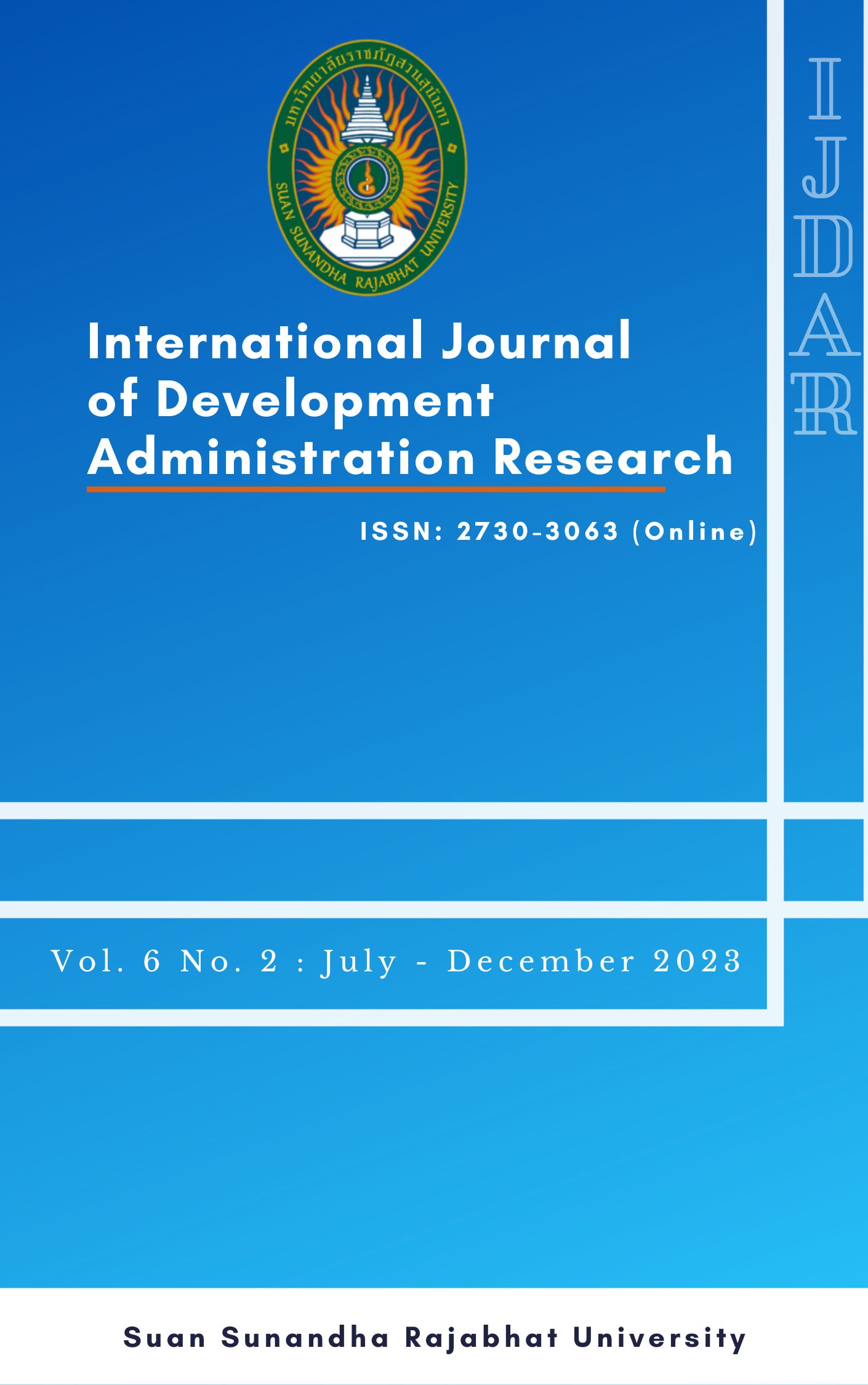The Influencing Factors of Teachers’ Intention to use Technology in the Classroom: Case Study of one Smart Campus Environments in Shandong Province, China
Main Article Content
Abstract
The purpose of this study is to investigate the Factors of Teachers’ Intention to use Technology in the Classroom. The perceived usefulness of smart education technology and the impact of using technology in smart environments. The perceived ease of use and Intention to use technology, and explore whether the actual teaching effect can be improved by the help of perceived usefulness. This provides a clearer outline of the subjective and objective factors influencing teachers' use of technology in smart environments. Drawing upon the Technology Acceptance Model (TAM), this study aims to systematically analyze and identify the key factors that affect Teachers’ Intention to use Technology to improve talent quality and promote sustainable development of smart education technology environment. Specifically, analyze the impact of perceived usefulness and perceived ease of use of Teachers’ Intention to use Technology, and propose strategies to enhance it. The quantitative research design using a questionnaire survey to collect data from the samples consisted of 110 teachers in a university in Shandong province, China. The results indicate that perceived usefulness and perceived ease of use have a positive impact on university Teachers’ Intention to use Technology
Article Details
License Terms
All articles published in this journal are licensed under the Creative Commons Attribution–NonCommercial–NoDerivatives 4.0 International License (CC BY-NC-ND 4.0).
Under this license, users are permitted to:
- Share — copy and redistribute the material in any medium or format.
Under the following conditions:
- Attribution (BY)
Users must give appropriate credit to the author(s) and the journal, provide a link to the license, and indicate if any changes were made. Attribution must not suggest endorsement by the author(s) or the journal.
- NonCommercial (NC)
The material may not be used for commercial purposes. Any use primarily intended for or directed toward commercial advantage or monetary compensation is prohibited without prior written permission from the copyright holder.
- NoDerivatives (ND)
If users remix, transform, translate, adapt, or build upon the material, they may not distribute the modified material. The work must be shared in its original and unaltered form.
This license ensures that published works remain freely accessible to the academic community and the public, while protecting the integrity of the original research and the rights of the author(s).
For the full legal code of this license, please visit:
https://creativecommons.org/licenses/by-nc-nd/4.0/
References
Baek, Y., Jung, J., & Kim, B. (2008). What makes teachers use technology in the classroom? Exploring the factors affecting facilitation of technology with a Korean sample. Computers & Education, 50(1), 224-234.
Bdiwia, N. (2019). The role of teachers in smart classroom teaching activities and its impact on the initial outcomes of student participation. International Journal of Emerging Technologies in Learning (iJET), 14(15), 168-180.
Chasuwan, R., Aujirapongpan, S., & Ritkaew, S. (2022). Acceptance of Mobile Banking Technology of the Elderly in The Upper Southern Thailand. Journal of Business Administration the Association of Private Higher Education Institutions of Thailand, 11(1), 159-174.
Chen, W. (2020). Challenges and Countermeasures for the Application of Educational Technology in China's Higher Education Institutions. International Journal of Emerging Technologies in Learning (iJET), 15(21), 85-97.
Chen, Y. H., Chen, C. M., & Wu, C. Y. (2018). An empirical study on the determinants of university teachers' intention to use cloud computing. British Journal of Educational Technology, 49(2), 238-253. https://doi.org/10.1111/bjet.12476
Davis, F. D. (1989). Perceived usefulness, perceived ease of use, and user acceptance of information technology. MIS Quarterly, 13(3), 319-340. https://doi.org/10.2307/249008
Hassan, R. A. (2019). Teachers' Use of Educational Technology: A Mixed-Method Study in a Rural Secondary School. Journal of Educational Computing Research, 57(1), 27-49.
Huang, L. C., Wu, Y. T., & Huang, C. C. (2015). Factors affecting teachers' adoption of multimedia teaching resources based on the technology acceptance model. Journal of Educational Technology & Society, 18(1), 36-50. https://www.jstor.org/stable/10.2307/jeductechsoci.18.1.36
Jin, H. (2020). A Study on the Integration of Teaching and Research in Universities Based on the Development of Smart Education. International Journal of Emerging Technologies in Learning (iJET), 15(12), 145-156.
Kudryashova, E., & Khitrik, O. (2020). The advantages of using smart technologies in the educational process: Evidence from a study of educational institutions in Russia. Education and Information Technologies, 25(4), 2679-2692.
Li, J. (2018). The effects of online word-of-mouth and online advertising on the technology acceptance model: An empirical study on mobile social games. Sustainability, 10(9), 3309. https://doi.org/10.3390/su10093309
Navavongsathian, A., Vongchavalitkul, B., & Limsarun, T. (2020) Causal factors affecting mobile banking services acceptance by customers in Thailand. The Journal of Asian Finance, Economics and Business, 7(11), 421-428.
Niu, J., Li, Y., & Ma, W. (2019). A comparative study on the job satisfaction of teachers from different disciplines. Educational Research, 40(9), 97-105.
Saleh, K., Ahmed, M., Rehman, M. U., Khan, H. U., & Ahmad, A. (2019). An expert-based reliability analysis approach for renewable energy systems. Renewable Energy.
Venkatesh, V., Morris, M. G., Davis, G. B., & Davis, F. D. (2003). User acceptance of information technology: Toward a unified view. MIS Quarterly, 27(3), 425-478. https://doi.org/10.2307/30036540
Vongchavalitkul, B., Navavongsathian, A., Limsarun, T., Damrongpong, N., & Yenyuek, C. (2022). The Implication Factors of Thai’s User Adoption toward Banking Technology in the Next Normal. The Journal of Development Administration Research, 12(4), 743-753.
Wang, Q., & Liang, T. (2021). Perceived Usefulness of Smart Education Technology and Its Impact on Teachers' Use in Smart Environments. Education Sciences, 11(1), 38. doi:10.3390/educsci11010038.
Wang, Q., Chen, W., & Liang, Y. (2021). Exploring the relationship between teaching innovation and teachers’ attitudes toward using educational technology: A moderated mediation analysis. Journal of Educational Computing Research, 59(1), 46–64. https://doi.org/10.1177/0735633120905343
Wang, Y., Sun, J., & Huang, R. (2019). Research on teaching process management in smart classroom based on big data analysis. Journal of Physics: Conference Series, 1265(1), 012093.
Wu, J. H., & Wang, S. C. (2005). What drives mobile commerce? An empirical evaluation of the revised technology acceptance model. Information & Management, 42(5), 719-729. https://doi.org/10.1016/j.im.2004.07.001


